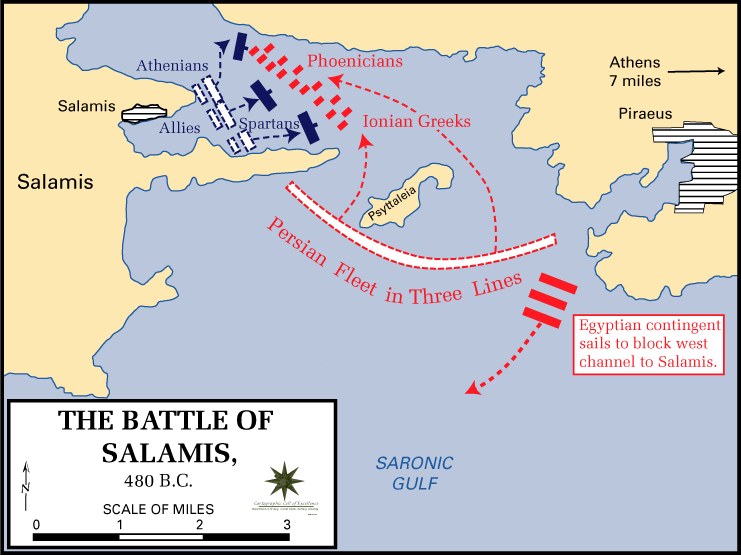
Battle of Salamis
The Battle of Salamis (/ˈsæləmɪs/ sal-ə-MISS) was a naval battle fought in 480 BC, between an alliance of Greek city-states under Themistocles, and the Achaemenid Empire under King Xerxes. It resulted in a decisive victory for the outnumbered Greeks. The battle was fought in the straits between the mainland and Salamis, an island in the Saronic Gulf near Athens, and marked the high point of the second Persian invasion of Greece. It was arguably the largest naval battle of the ancient world,[7] and marked a turning point in the invasion.[8]
For other uses, see Battle of Salamis (disambiguation).
To block the Persian advance, a small force of Greeks blocked the pass of Thermopylae, while an Athenian-dominated allied navy engaged the Persian fleet in the nearby straits of Artemisium. In the resulting Battle of Thermopylae, the rearguard of the Greek force was annihilated, while in the Battle of Artemisium the Greeks suffered heavy losses and retreated after the loss at Thermopylae. This allowed the Persians to conquer Phocis, Boeotia, Attica and Euboea. The allies prepared to defend the Isthmus of Corinth while the fleet was withdrawn to nearby Salamis Island.
Although heavily outnumbered, the Greeks were persuaded by Athenian general Themistocles to bring the Persian fleet to battle again, in the hope that a victory would prevent naval operations against the Peloponnese. Persian king Xerxes was also eager for a decisive battle. As a result of subterfuge on the part of Themistocles (which included a message directly sent to Xerxes letting him know that much of the Greek fleet was stationed at Salamis), the Persian navy rowed into the Straits of Salamis and tried to block both entrances. In the cramped waters, the great Persian numbers were an active hindrance, as ships struggled to maneuver and became disorganized. Seizing the opportunity, the Greek fleet formed in line and achieved a decisive victory.
Xerxes retreated to Asia with much of his army, leaving Mardonius to complete the conquest of Greece. The following year the remainder of the Persian army was decisively defeated at the Battle of Plataea and the Persian navy at the Battle of Mycale. The Persians made no further attempts to conquer the Greek mainland. The battles of Salamis and Plataea thus mark a turning point in the course of the Greco-Persian Wars as a whole; from then onward, the Greek poleis would take the offensive.
Anchorage discovery[edit]
On March 17, 2017, archaeologists announced that they had uncovered the partially submerged remains of the anchorage used by the Greek warships prior to the Battle of Salamis. The location of the ancient mooring site is on the island of Salamis, at the coastal Ambelaki-Kynosaurus site.[145]